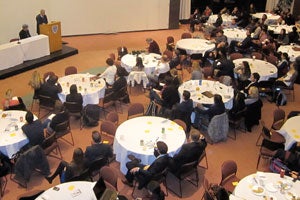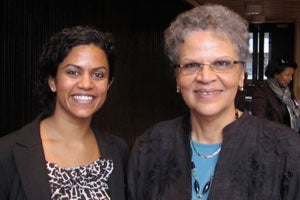
Top practitioners, heads of state, academics, and theoreticians in international development came together with more than 200 students and community members for “Rebuilding After the Storm: The Role of Law in Development Post Natural Disasters,” the HLS Law & International Development Society’s inaugural symposium, held on Nov. 19, 2010.
The one-day conference included two keynote presentations and two panel discussions, focused on different aspects of development after natural disasters, and drew students from area graduate programs as well as representatives from international non-profit organizations—such as Acción International—as well as individuals from other law schools, including the associate dean of the University of Puerto Rico School of Law.
Focusing on two recent and pressing natural disasters—the earthquake in Haiti and the floods in Pakistan—the conference featured keynote speakers Amartya Sen, Nobel Prize winner and one of the foremost scholars in development theory, and Michèle Pierre-Louis, who served as prime minister of Haiti from September 2008 to November 2009.
“In a system that was already weak, the loss of human and physical capital weighs heavily,” said Pierre-Louis, noting the challenges facing a resource-constrained country trying to rebuild following a natural disaster. She went on, however, to reflect on the possibilities for reform that arise when outdated systems collapse. “In the chaos of the post-earthquake situation, there are also opportunities to seize.”
Pierre-Louis quoted other scholars and provided her own ideas about the most crucial first-steps Haiti should be taking. One of her primary recommendations focused on the documentation of individuals and the importance of registration and identification. About 60 percent of the population has no legal existence, she said, and civil registration should be a fundamental right.

Sen discussed the Pakistan floods and the challenges for development as the country begins to rebuild, focusing on human rights as well as the need for a “disaster-inclusive understanding of development.”
“Human rights are not only the children of law, but they are the parents of law,” Sen said, putting forward the idea that human rights must be part and parcel of development, and that it is necessary that people address human rights openly and directly. “The biggest enemy of human rights is silence,” he said.
During a panel focused on the post-disaster economies, Deli Ratha of the World Bank; Ali Cheema, an economist and professor; and Carine Roenen, director of Fonkoze, the largest microfinance organization in Haiti, explored issues including the use of law in the post-disaster economy to support strategies aimed at increasing the flow of resources.
The other panel tackled the challenges countries face in rebuilding but also methods for protecting against the collapse of the rule of law in case of disasters. Participants included Eduardo Valencia-Ospina, the UN special rapporteur on the protection of persons in the event of disasters, Vivienne O’Connor from the U.S. Institute of Peace, Erica Harper from the International Development Law Organization and Kala Mulqueeny, a senior counsel from the Asian Development Bank.
Also present at the symposium were members the Harvard Pakistan Student Group and the Harvard Caribbean Law Association, who were there to provide information about the current situation in Pakistan and Haiti, respectively. HPSG is currently running a university-wide campaign to raise awareness about the Pakistan flood and its victims.
The symposium was hosted by the HLS Law & International Development Society, known as LIDS, a student group that was created two years ago to help students and the greater Harvard community engage in international development. They work through hands-on projects with international organizations as well as through events such as the symposium that create forums for discussion about the role of the law in the development sphere.
“This symposium was an opportunity to further LIDS’ mission to increase recognition of the growing importance of the legal profession in the international development discussion,” said Anne Healy ‘11, one of the co-presidents of LIDS. “It was an excellent forum to begin conversations and to build relationships with our speakers and other practitioners who attended, and we are excited to continue these relationships into the future.”